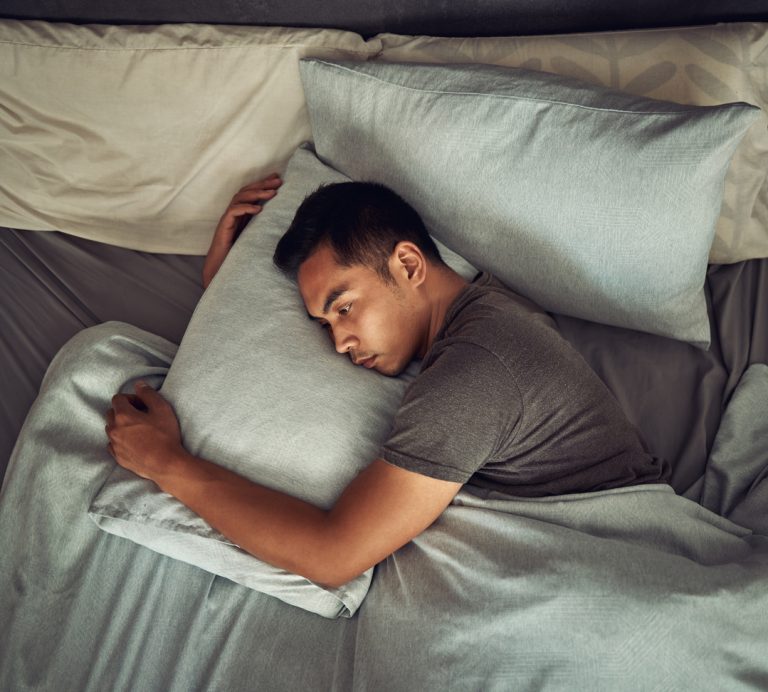Occasionally, we all have trouble sleeping at night, and the odd night of poor sleep can result in us not feeling our best the next day. But if you’re having difficulty sleeping and there doesn’t seem to be an end in sight, there could be a reason. Read on for some of the common causes of insomnia in men.
Why Is Sleep So Important?
The CDC recommends 7-9 hours of sleep for maintaining cognitive and behavioral functions.
Studies have shown sleep deprivation can lead to attention lapses, mood shifts or low mood, reduced cognitive ability, and delayed reactions if you frequently don’t get enough sleep. In addition,
lack of sleep has been linked to a higher risk of certain medical conditions, such as type 2 diabetes, heart disease, stroke, high blood pressure, obesity, and poor mental health.
Sleep is when we rest, recharge, and prepare for the next day. High-quality sleep enables you to think, feel, and perform better, maximizing your time and energy. If you’re frequently having trouble sleeping, you’re missing out on this vital time to reset.
Signs that you’re not getting enough sleep:
- Feeling tired or lacking in energy during the day
- Struggling to pay attention to a task or conversation
- Lacking in motivation
- Feeling irritable or losing your temper quickly
- Relying on an alarm clock to wake up
- Starting to doze off on the sofa, in the car, or during conversations
5 Causes of Insomnia In Men
1. Low Testosterone
Many medical conditions can interrupt sleep patterns, becoming more common as you age. Low testosterone is one medical condition that can disrupt your sleep;
studies have shown that sleep deprivation can lead to lower testosterone and low testosterone levels can lead to poor sleep. Thus, treating low testosterone levels with
testosterone replacement therapy (TRT) can help some men sleep better.
2. Aging
It’s common for insomnia in men to increase as they age; this is due to changes in a part of the brain called the hypothalamus, which is composed of approximately 20,000 cells, creating the suprachiasmatic nucleus (SCN). The
SCN controls our circadian rhythms, which tells our body how sleepy or alert we are. As people age, so does the SCN, which can disrupt circadian rhythms, and throw your normal feelings of tiredness out of sync.
3. Stress and Mental Health
Stress can impact your sleep, whether it’s due to a full schedule, the pressure of work, or family commitments. According to a survey by the Sleep Foundation,
43% of people surveyed reported lying awake at night due to stress. Mental health challenges and sleep can have a cause-and-effect cycle, for example, low mood and depression can lead to insomnia in men; however, insomnia can also result in a poor sense of well-being and depression.
4. Emotional Shock and Bereavement
Changes that have a significant emotional impact, such as the death of a loved one, divorce, or even positive changes like moving home can impact sleep quality, from staying up late to oversleeping in the morning.
5. Stimulants
According to new research, alcohol or nicotine intake within four hours of going to bed is associated with worse sleep than in instances when the substances weren’t used.
Insomnia in Men: When to Speak to a Doctor
Insomnia is generally characterized by trouble sleeping or staying asleep, resulting in poor sleep or difficulty with daily activities. If you’re having trouble sleeping for at least three nights a week, and it lasts for at least a month, you could have insomnia; consider speaking to a doctor or healthcare provider.
It could be helpful to keep track of your sleep in a daily sleep diary for at least two weeks, as this could help you notice any patterns and potential triggers for your insomnia.
At Opt Health, our team of
men’s vitality doctors can provide you with specialized advice in a discrete setting in the privacy of your own home. Our specialized doctors can help with a range of health concerns, such as insomnia in men,
low testosterone and TRT, and prostate health. We’re here to help you feel like you again.
Speak to an expert physician one-on-one over video conferencing, receive test results, and get medication delivered, all from the comfort of your own home.

